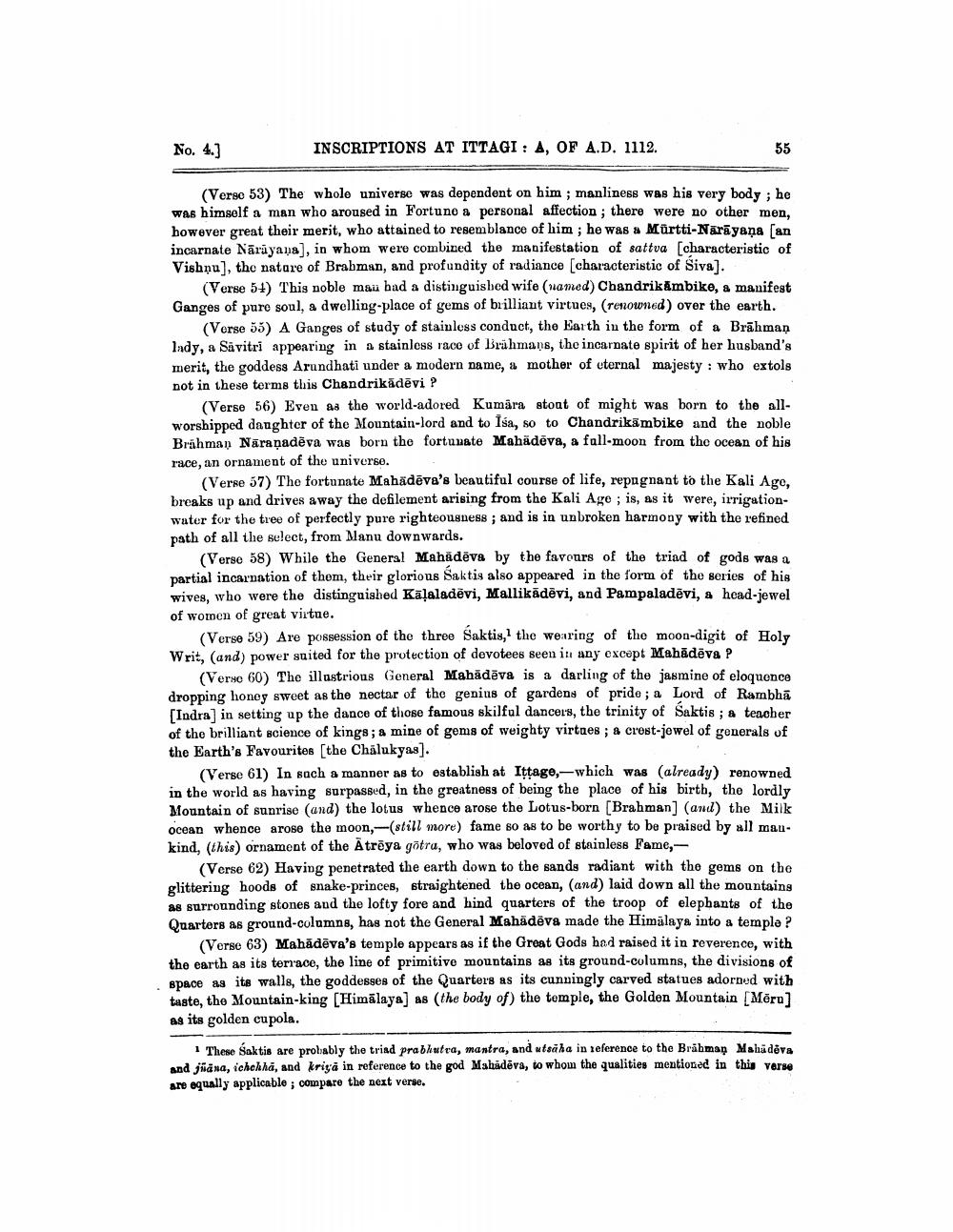________________
No. 4.]
(Verse 53) The whole universe was dependent on him; manliness was his very body; he was himself a man who aroused in Fortune a personal affection; there were no other men, however great their merit, who attained to resemblance of him; he was a Mürtti-Narayana [an incarnate Nārāyaṇa], in whom were combined the manifestation of sattva [characteristic of Vishnu], the nature of Brahman, and profundity of radiance [characteristic of Siva].
INSCRIPTIONS AT ITTAGI: A, OF A.D. 1112.
55
(Verse 54) This noble mau had a distinguished wife (named) Chandrikambike, a manifest Ganges of pure soul, a dwelling-place of gems of brilliant virtues, (renowned) over the earth.
(Verse 55) A Ganges of study of stainless conduct, the Earth in the form of a Brāhmaṇ lady, a Savitri appearing in a stainless race of Brahmans, the incarnate spirit of her husband's merit, the goddess Arundhati under a modern name, a mother of eternal majesty: who extols not in these terms this Chandrikādēvi ?
(Verse 56) Even as the world-adored Kumara stout of might was born to the allworshipped daughter of the Mountain-lord and to Isa, so to Chandrikambike and the noble Brahman Naraṇadeva was born the fortunate Mahadeva, a full-moon from the ocean of his race, an ornament of the universe.
(Verse 57) The fortunate Mahadeva's beautiful course of life, repugnant to the Kali Age, breaks up and drives away the defilement arising from the Kali Age; is, as it were, irrigationwater for the tree of perfectly pure righteousness; and is in unbroken harmony with the refined path of all the select, from Manu downwards.
(Verse 58) While the General Mahadeva by the favours of the triad of gods was a partial incarnation of them, their glorious Saktis also appeared in the form of the series of his wives, who were the distinguished Kalaladēvi, Mallikādēvi, and Pampaladevi, a head-jewel of women of great virtue.
(Verse 59) Are possession of the three Saktis,1 the wearing of the moon-digit of Holy Writ, (and) power suited for the protection of devotees seen in any except Mahādēva ?
(Verse 60) The illustrious General Mahadeva is a darling of the jasmine of eloquence dropping honey sweet as the nectar of the genius of gardens of pride; a Lord of Rambha [Indra] in setting up the dance of those famous skilful dancers, the trinity of Saktis; a teacher of the brilliant science of kings; a mine of gems of weighty virtues; a crest-jewel of generals of the Earth's Favourites [the Chalukyas].
(Verse 61) In such a manner as to establish at Ittage,-which was (already) renowned in the world as having surpassed, in the greatness of being the place of his birth, the lordly Mountain of sunrise (and) the lotus whence arose the Lotus-born [Brahman] (and) the Milk ocean whence arose the moon,-(still more) fame so as to be worthy to be praised by all maukind, (this) ornament of the Atreya götra, who was beloved of stainless Fame,
(Verse 62) Having penetrated the earth down to the sands radiant with the gems on the glittering hoods of snake-princes, straightened the ocean, (and) laid down all the mountains as surrounding stones and the lofty fore and hind quarters of the troop of elephants of the Quarters as ground-columns, has not the General Mahadeva made the Himalaya into a temple?
(Verse 63) Mahadeva's temple appears as if the Great Gods had raised it in reverence, with the earth as its terrace, the line of primitive mountains as its ground-columns, the divisions of space as its walls, the goddesses of the Quarters as its cunningly carved statues adorned with taste, the Mountain-king [Himalaya] as (the body of) the temple, the Golden Mountain [Meru] as its golden cupola.
1 These Saktis are probably the triad prabhutva, mantra, and utsäha in reference to the Brahman Mahādēva and jüäna, ichekha, and kriga in reference to the god Mahadeva, to whom the qualities mentioned in this verse are equally applicable; compare the next verse.




